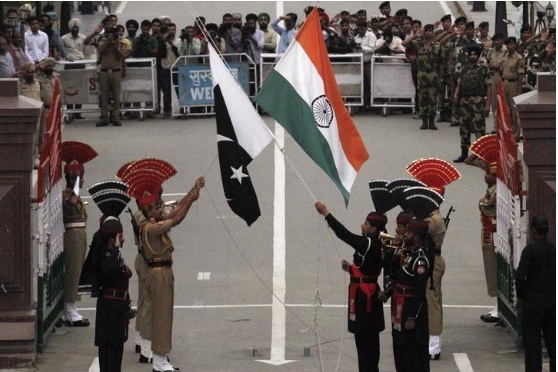
This is one war between traditional rivals India and Pakistan that has really been scaling new heights. The war of flags between the two countries at the Attari-Wagah joint check post (JCP) is set for a renewal with the authorities on the Indian side readying to make the tricolour flutter once again on top of a 360-feet tall flagpole at Attari.
While the Pakistani national flag has been fluttering since last August, the Indian flag had to be taken off on a few occasions last year as strong winds along the border belt have repeatedly damaged the tricolour.
The Amritsar Improvement Trust (AIT), which manages the Indian flag at Attari, 30 km from the Sikh holy city, has handed over the task of hoisting and maintenance of the flag to Delhi-based company Fast Track. The company manages the giant national flag fluttering at the Central Park in New Delhi's busy Rajiv Chowk.
Both the countries are spending millions of rupees annually to remain involved in this war of flags. The AIT has given the contract for maintaining the flag to the company for over Rs 46 lakh (almost $72,000) annually.
The 360-feet high pole and flag was installed last year at a cost of Rs 3.5 crore. The flag, which got damaged four times, has been replaced five times at a cost of Rs 6 lakh each time.
Even though the Pakistani flag is fluttering on a higher 400-feet pole, the Indian authorities have decided to keep the tricolour at a height of 360 feet only.
"The height of the pole will remain fixed at 360 feet. There is no proposal at present to increase the height. The company will be responsible for keeping the tricolour fluttering," AIT executive engineer Ravi Kumar said.
India had pipped Pakistan in this war of flags by hoisting the flag in March last year, much ahead of Pakistan's move to hoist a flag near the JCP. It was reported that the Indian flag was even visible from Lahore city, one of the biggest cities in Pakistan which is around 15 km from the Wagah border.
However, the Indian flag had to be taken off from the pole as the strong winds repeatedly damaged it. The main reason for this was that the tricolor is made, as per specifications, from Khadi material which could not sustain itself at the height of 360 feet. The Pakistani flag is reported to be made from finer and stronger material which can sustain strong winds.
The Attari-Wagah JCP gets thousands of visitors from both sides every evening to witness the lowering of the national flags of the two countries at the border gates and the closure of the gates for the night.
"We could see the Pakistan national flag from some distance during our visit. But on our side, only the tall pole was standing and there was no flag. We were disappointed," Arvind Chauhan, a visitor from Delhi, said.
The AIT had put up another flag, on top of a 170-feet pole, at Ranjit Avenue along the National Highway No. 1 (NH-1) which connects Amritsar bypass to the border belt at Attari. The flag here has also been replaced 14 times.
Activists feel that putting up of the flags was a wasteful move due to the high cost of putting them and spending lakhs of rupees annually on maintenance.
(Jaideep Sarin can be reached at jaideep.s@ians.in)









